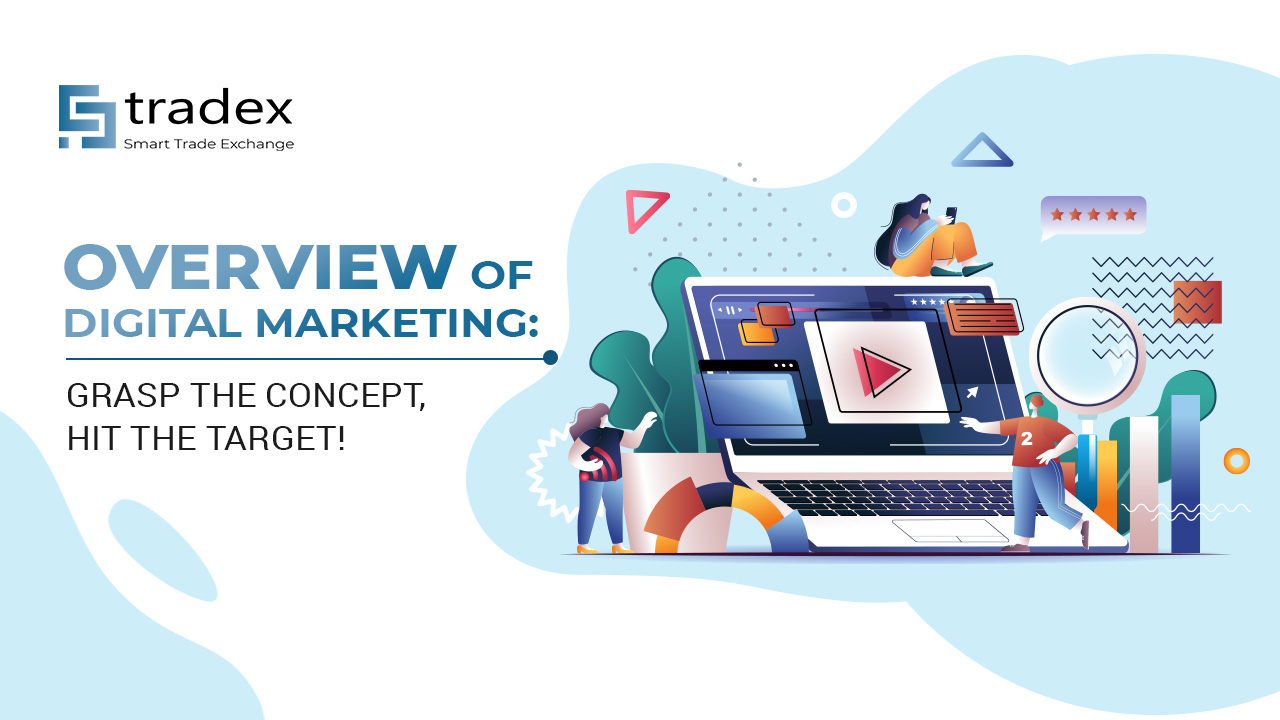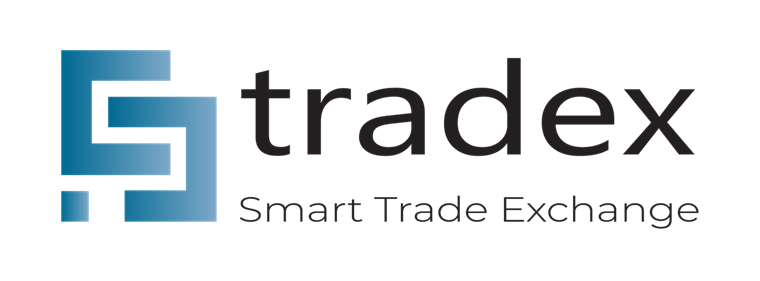19 March, 2024
WHAT IS DIGITAL MARKETING? 7 ESSENTIAL SKILLS OF A DIGITAL MARKETER
Businesses are increasingly using digital marketing, which involves promoting brands and reaching customers through electronic devices or the Internet.

As used here, "digital marketing" refers to any form of advertising that reaches its target audience specifically through digital platforms.
In this tech-driven era, where consumer behavior is heavily influenced by digital marketing, the field has also experienced substantial growth. A lot of young people are interested in this field because it's one of the most fascinating ones right now. Would you be interested in reading this article about digital marketing with me? We could use Stradex to do just that.
What is Digital Marketing?
Philip Kotler defines digital marketing as "the process of planning for product, price, distribution, and promotion of products, services, and ideas to meet the needs of organizations and individuals based on electronic media and the internet." He stated it was essentially the same thing when pressed for clarification.
What Joel Reedy calls "Electronic Marketing" "includes all activities to satisfy the needs and desires of customers through the internet and electronic media."
So, it's reasonable to say that all ads promoting a business's name, goods, or services through digital media or the internet are part of digital marketing.
.jpg)
The Advantages That Make Digital Marketing Popular
Digital marketing has become an effective means of implementing communication strategies. With that in mind, why is online advertising so advantageous?
Convenience
The advent of digital marketing has freed businesses from the constraints of time and location. They are even allowed to keep their doors open on weekends without paying their employees more. It is still easy to look for products and services, read reviews, and communicate with sellers to make a purchase.
Additionally, buyers enjoy the flexibility of being able to purchase online whenever and wherever they like. Businesses don't need to set up shop there to sell their items; here is why.
Accessibility
Another perk of digital marketing is the ability to communicate with and reach a large audience of customers. In order to sell their products in other nations or areas, companies do not require a physical storefront. Without investing in localized distribution networks, companies may reach a wider audience and develop international alliances.
Another perk of online marketing is the ease with which promotional materials may be shared across various digital channels including websites, emails, and social media. With a few clicks, businesses may easily reach thousands of potential clients.
.jpg)
Businesses can connect with customers all around the world through digital marketing.
Cost-effectiveness
For more traditional types of advertising including events, news, television, direct mail, etc., a substantial amount is typically required. Spending hundreds of millions—if not billions—of dong is not uncommon for companies to target specific demographics.
Conversely, digital marketing strategies are far more cost-effective. Companies can still save money while reaching a big audience by utilizing this method. In addition, compared to more traditional types of advertising, the time to deploy is far less.
Personalization
Any business serious about making an impression through advertising should prioritize data customisation. Businesses can gain a competitive edge in digital marketing by analyzing customer data gathered from digital marketing campaigns or devices' inputs. With that data in hand, they may better target their communications to the behaviors of potential customers.
By tracking consumers' actions across the web (such as searches, preferences, and purchases), businesses may better cater to their unique needs. Companies can enhance their sales strategies with the use of this data, leading to higher income.

Personalized marketing can boost a company's revenue and customer loyalty.
Building Relationships
The internet makes it easy for companies to connect with customers, share information, and communicate. So, businesses make adjustments to their products and digital marketing strategies based on what they learn about customer needs and wants through interactions with customers.
Furthermore, companies can maximize their advertising costs across many channels by participating in relationship-building activities, which help them understand their target client groups better. Email is another tool that companies can use to stay in contact with their existing clientele. This is a fantastic method of expressing gratitude, promoting new products or services, etc.
Community
Digital marketing allows businesses to advertise more products to more people by using the power of social media. Businesses can use X, Instagram, Facebook, LinkedIn, Snapchat, TikTok, and a plethora of other social media platforms for digital marketing.

Social media marketing has allowed businesses to access a huge audience in this digital era.
11 important components of Digital Online Marketing
Digital marketing can be broadly classified into two types: online and offline. Digital internet marketing, which is heavily reliant on the Internet, consists of eleven main components. Just how does digital marketing operate on the internet?
Search Engine Optimization (SEO)
This method is called search engine optimization (SEO) when used by search engines. Online marketing strategies like search engine optimization (SEO) aim to increase a website's exposure in major search engines such as Google, Bing, and Cốc Cốc. Consequently, the website can attract more organic visitors without incurring additional ad costs. Plus, it raises people's familiarity with a company's name and its products, which in turn increases sales.
Content Marketing
Content marketing, which comprises creating and promoting content, can increase brand awareness, traffic, and prospective customers. Content marketing often makes use of audio and visual elements such as infographics, ebooks, whitepapers, and blog posts.
Social Media Marketing
The term "social media marketing" describes a kind of digital advertising that promotes a business's products and services through participation in various social media sites. Increasing website traffic and interaction, broadening the brand's appeal, and increasing the number of consumers are all part of the plan. Effective communication like this is beneficial for any type of business, even startups.
Businesses often employ X, Facebook, TikTok, YouTube, Zalo, Instagram, LinkedIn, Pinterest, and a plethora of other famous social media platforms in their digital marketing initiatives. Content display formats differ between channels. For example, graphic content works better on Instagram and Pinterest, while video content works better on YouTube and TikTok.

Businesses may reach a wide variety of consumers through social media advertising.
Pay Per Click (PPC)
By allowing advertisers to earn money with every click, pay-per-click (PPC) advertising aims to boost website traffic. Search engine platforms like Google often use this strategy. Advertisers pay to have their ads displayed when users search for specific terms on search engines.
In addition, PPC may be utilized by businesses on numerous platforms, including Facebook, YouTube, X, LinkedIn, Bing, Cốc Cốc, and countless more.
Affiliate Marketing
Affiliate marketing allows companies to promote their goods and services to customers by leveraging the marketing channels of earning partners, who are often publishers. Some examples of these channels include promoting affiliate products and services on the partner's social media accounts, selling items and services through relevant content on websites, and hosting video ads through YouTube's partner program.
Native Advertising
Sponsored adverts known as "native ads" blend in with the design of a website or app, sometimes appearing alongside user-generated content. Vietnamnet and VnExpress are two major news websites that frequently feature local advertisements.

Native advertising has been increasingly popular among online marketers in recent years.
Marketing Automation
The phrase "marketing automation" refers to the practice of automating and streamlining marketing campaigns via the use of various digital technologies. With marketing automation, companies may streamline their operations and save a lot of time by eliminating manual tasks. Automation of email campaigns, scheduling of social media posts, tracking and reporting of campaigns, and many more instances are at your fingertips.
Email Marketing
The term "email marketing" describes the practice by which businesses promote their products, services, events, or website connections using mass electronic mail. A lot of people think it's a fantastic way for businesses to communicate with their customers.
Businesses can run a wide variety of email marketing campaigns, including those that solicit newsletter subscriptions, encourage clients to download certain website material, welcome new customers, show gratitude on special occasions, and many more.
PR Online
"PR Online" refers to public relations campaigns that aim to enhance a company's reputation using online mediums such as websites, blogs, online newspapers, forums, and the like.
All the advantages of conventional public relations are available in PR Online, including increased brand awareness, trustworthiness, and accessibility. Businesses may monitor the success of their initiatives by keeping tabs on key performance indicators such as conversion rates, website traffic, search engine rankings, and more.

How does one define "public relations" in the context of digital marketing? When businesses use online platforms to communicate with the public about their reputation, they are engaging in public relations online.
Inbound Marketing
Increased conversions are the end result of inbound marketing's efforts to attract and keep customers through the provision of relevant, high-quality content and services. By being responsive to customer needs and gaining their confidence in the process, firms may approach clients in a natural and proactive way through inbound marketing.
Sponsored Content
Sponsored content is created and shared by third parties with the purpose of promoting a business's brand or products. Promotion of goods and services through prominent and esteemed individuals is known as "influencer marketing," and it is one of the most popular forms of sponsored content used today.

Sponsored content is a common marketing tactic for many brands looking to increase awareness and sales.
What is Digital Marketing? Job roles in Digital Marketing
Numerous individuals are perplexed regarding the precise definition of digital marketing, despite the fact that this domain is currently experiencing immense popularity. Details about a few digital marketing jobs are detailed below.
SEO Manager
The SEO Manager's role in digital marketing is to oversee and track the organization's organic website traffic. Search engine optimization (SEO) encompasses on-page, off-page, and technological aspects, all of which they employ to get high search engine ranks. In addition to managing search engine optimization (SEO) initiatives, content teams are also responsible for reporting to SEO managers on whether or not published content complies with Google's standards and algorithms.
Content Marketing Specialist
Publishing engaging content on the company's digital channels is the primary responsibility of the Content Marketing Specialist in attracting and retaining customers. Website traffic, time on page, and channel subscriptions are common KPIs.
Pros in the field of content marketing make detailed strategies for the production of content in a variety of formats (text, images, videos, infographics, etc.) and stick rigidly to those plans. Regular cross-departmental collaboration ensures that all digital media ads are consistent with product and campaign messaging.

What exactly does a content specialist accomplish in the realm of digital marketing? Their mission is to provide material for many online mediums.
Social Media Marketing Manager
Social media marketing managers are primarily responsible for creating, overseeing, and growing the company's presence on various social media platforms. Standard Key Performance Indicators (KPIs) include the amount of people who follow, share, and view a post in their newsfeeds. Experts in content marketing work directly with them to develop social media platform-specific content strategies.
7 Skills Required for a Digital Marketer
In addition to being up-to-date on digital marketing trends, the following skills are essential for a successful digital marketer:
SEO Skills
Increasing a website's visibility in search engine results is the goal of search engine optimization, or SEO. Many companies are looking for digital marketers with this skill because it is crucial. Search engine optimization mostly comprises:
- SEO On-page: When search engine optimization (SEO) takes place on a website page, it modifies the page's text, layout, and code. The primary goals of on-page SEO are to enhance the user experience and the website's rating.
- SEO Off-page: Social bookmarking, link building, and social media marketing are all examples of "off-page SEO," which refers to optimization of components other than websites.
- SEO Technical: Technical SEO, or search engine optimization, involves making adjustments to a website so that it conforms to the exact technical requirements established by search engines. Site design, navigation, page load speeds, content density, error pages, and other related metrics fall under this category.

Skill in search engine optimization (SEO) is essential for digital marketers.
Social Media Marketing Skills
The average internet user spends approximately 6 hours and 37 minutes each day on the web in early 2023, with 2 hours and 31 minutes of that time being devoted to social media, according to research by We Are Social and Meltwater. Digital marketers, seize the moment to interact with potential customers. Having a strong understanding of social media marketing is vital if you want your digital marketing operations to be more productive.
Data Analysis
To be a digital marketer, you don't always need experience with data analysis. Impressions, engagement metrics, time on page, bounce rate, and other digital marketing statistics should be no stranger to you. What this means is that you may evaluate your digital marketing campaigns, identify their weaknesses, and propose improvements.

As a digital marketer, you need to know how to analyze data so you can improve your campaigns and make smart decisions.
PPC Skills
There are a lot of tools available to businesses who want to grow their customer base on the internet. However, they aren't always aware of the best methods to use these resources to increase ROI. Here is where PPC advertising specialists can assist businesses maximize their ROI through digital marketing.
Expertise in both content creation and copywriting The "core" component of marketing strategy is content, which is used to convey messages and promote goods and services. Mastering the art of copywriting and content creation is essential if you aspire to achieve great success in this field.
Spreading the news about your digital marketing strategy will be a breeze once you've mastered these skills. Understanding content SEO is also necessary for search engine optimization (SEO). Content SEO comprises studying keywords and enhancing articles to achieve high evaluations and ranks on Google.
Why is it critical for staff to possess solid content abilities when providing digital marketing services? Having it back the approach will help get the message out more effectively.
Email Marketing Skills
Building an effective email marketing strategy requires knowledge of the proper procedures and the software and resources that support them. With these tools, you may access data such as open, click-through, and bounce rates, among others. When developing an email marketing strategy, you may make good use of this data.
Basic Design Skills
Most advertising campaigns will be more successful with well-designed and interesting visuals. Therefore, it is crucial for digital marketers to have a fundamental understanding of design concepts. However, prior knowledge or expertise in design is not required. Instead, focus on honing your design thinking and user experience skills if you wish to come up with concepts for visually appealing designs.

Having even a rudimentary grasp of design will put you ahead of the competition when seeking employment in digital marketing.
Acquiring the aforementioned skills and becoming acquainted with digital marketing tools will allow you to be more productive. Tools for conducting market research include Google Analytics, Google Trends, and SimilarWeb. One can track website performance with tools like Ahrefs, Google Analytics, and Semrush. You can do advertising research with tools like Bing Ads Intelligence and Google Ads Keyword Planner.
Summary of Digital Marketing Overview
The preceding gives a thorough overview of digital marketing, covering its definition, advantages, components, work duties, and necessary skills for a digital marketer. Please let me know how you feel about this area of study after reading this piece. If you would like to read more articles on marketing, you can follow Stradex.


